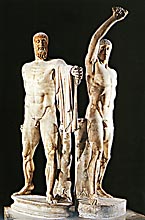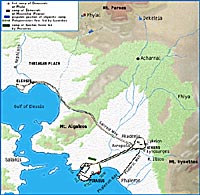In 404-3 B.C. Athens, following defeat in the Peloponnesian War, was forced to disarm and submit to the will of Sparta. It was in these circumstances that the Assembly of Citizens, under the pressure from the Spartan Lysander, appointed thirty superior archons known as the Thirty tyrants. After their assumption of power, they proceeded to the judicial assassination of democratic leaders and to the proscription of many citizens. Furthermore, they restored to the Areopagus the rights it had before the Ephialtic reforms (462/1 B.C.), abolished the courts of jurors and vested the Council of Five Hundred with the powers of a criminal court. They also drew up a catalogue of one thousand trustworthy citizens, who took turns in office and approved the decisions of the tyrants. |





